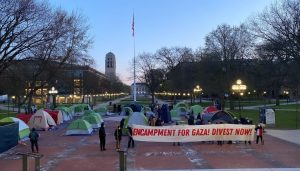Image from March 23, 1995 CUNY walkout from Slam! Herstory Project
When we think about why we’re rallying for better compensation and conditions as adjuncts of CUNY, we need to remember that we are in a teaching community. Our scholarship is our teaching and our teaching is our scholarship. We cannot separate these two if we see this from a community-based, Vygotskian definition of education, called obuchenie (oh-boo-CHAY-nyah). Obuchenie, according to Vygotsky, was multidirectional, which meant that teachers and students co-constructed knowledge, and education was mutual, collective, and socially transformative. I believe that CUNY is an educational ecology with relations flowing in many directions, meaning that what affects us as adjunct professors affects our students, which in turn affects their engagement in their own work and their own communities.
This is clear and has great weight in my adjunct teaching here. I work with grad students at Hunter and City Colleges who are NYC Teaching Fellows, developing knowledge and expertise to work as teachers upon getting their master’s degrees. This means our educational ecology also relates directly to our public schools and to our city’s youth. This powerful relationship also reflects the social and political realities outside our classrooms. This semester, my students are exhausted, carrying two to three graduate classes while also teaching full-time in NYC public schools. This is an especially heavy load to bear for these educators. There is great pressure on public schools and their teachers to perform, to resolve complex problems in a school system with a great history but a difficult present. Classes are oversized and under-staffed, and unrealistic and top-down programming and policy often demand longer and longer hours from teachers. (Sad as it is, I have become reluctant to ask my students how they are doing nowadays because I am helpless in the face of the reigning response of “I’m tired/beat/drained/sleep-deprived,” etc.) Likewise, hard for all of us is disillusionment with a political system that attempts at every turn to normalize hatred, fear, isolation, racist and sexist and xenophobic ideologies and behaviors, all of which are reflected in the ways our schools’ cultures are shifting toward a surveillance-based, controlling version of education. Last night, I had a student lose her temper and ask what the point was of discussing the importance of exploring the identity, agency, and subjectivity our students in public schools since all teachers are asked to do nowadays is “get them out” (meaning get students graduated). She was worn out and later apologized. But behind her outburst I heard her frustration, her exhaustion, her loss of hope at a situation that is choking off energy, time, and creativity slowly for public school teachers and the young people they work with every day.
So what does this mean for me? As a Graduate Center Fellow, I work long hours which include increasing pressure to supply greater support and accessibility to my students, all of which constitutes emotional labor that is poorly compensated yet greatly in need. Our educational ecology is bearing more and more pressure, and I am working longer and longer hours, putting in more and more energy to support, protect, defend, and damn it, educate. And this is in addition to other outside work I do. My point is: my role as an adjunct doesn’t stop with the students I teach at Hunter and City Colleges. It doesn’t stop with the work they do in public schools. It is a community-wide educational ecology in which our labor has direct impact on the education of all children and young people in our public schools. This in turn has consequences for our city, our state, and our country. However, this labor is compensated at $20/hour or less, depending on the week.
My commitments have not changed, but my health has begun to suffer in the last two months as a result of these increasing demands. My students likewise are sleep-deprived, exhausted, and struggling to keep up. I cannot provide the support for my students I otherwise could were I better compensated for this work, because I can only spare so much time and I have reached my limits. This affects everyone in our educational ecology, from PhD students to our city’s kids, and the outcomes are starting to emerge. The question will be, how does this affect not only our present, but our shared future to come?
Katie Entigar is a PhD candidate in Urban Education at the Graduate Center of the City University of New York. She is a professor in bilingual education and applied linguistics, teacher trainer, and ESL teacher, as well as a blogger and active participant in social justice related to immigrant rights and education. She is grateful to her colleagues at the GC for their deep commitments to better working conditions for all adjuncts and dedicates this article to their continued efforts to inspire and produce social change.










